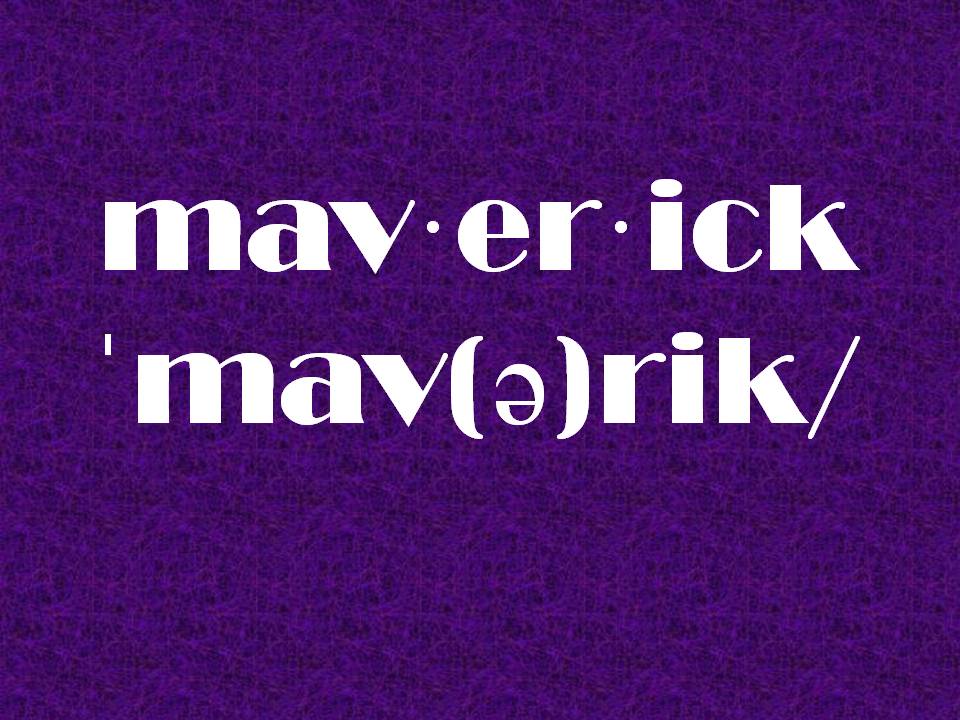All the World Loves a Maverick — or do they?

Last week someone introduced me as a maverick. While initially I thought of it as a compliment, now I’m not so sure.
The reality is that for many, being a maverick is never something to which they have aspired. Even if there should be, there don’t seem to be a lot of job ads seeking a maverick.
Typically defined as someone who exhibits great independence in thought and action, maverick was in fact the surname of a Texas lawyer named Samuel Maverick who refused to brand his cattle. As it turns out, it wasn’t so much about not wanting to inflict pain on the animals as it was about him being more interested in politics than in ranching.
My soft spot for mavericks started when I was quite young. My father had been sent to Detroit for training related to his new position as a foreman at GM. Knowing that I loved to read, he brought me back a book called, “Nurses Who Led the Way”.
One of my favourite stories from the book was about Florence Nightingale. Without a doubt she would be considered a maverick because, as difficult as it seems to believe now, she was the first to make hygiene a priority among those who were ill or injured. Despite significant opposition to her ideas, she was credited with reducing the death rate from 42% to 2% during the Crimean War.
Unfortunately, Nightingale and other mavericks like her, have a tendency to annoy others.Their new ideas often create discord, make people feel uncomfortable, and rattle our sense of security.
Too often, mavericks are viewed as a “thorn in our side” because they, like Nightingale, question, criticize, and suggest improvements for existing practice and future direction within their government, business, or non-profit settings.
Sadly, and to the detriment of innovation and growth, mavericks aren’t typically valued or promoted as much as they should be.
I was recently dismayed to hear from a colleague who is employed by the Ontario provincial government that she had been told by her director — as if it were a negative attribute — that she was too innovative to be working as a public servant.
At a time in history when it has never been more important to be innovative, what can we do to harness the talent of mavericks and the innovation they are capable of delivering?
Outcome-based leadership will be critical. By that I mean when working with a maverick, it will be critically important to be clear about why something needs to be addressed. The maverick will then be able to focus on that end result while generating the what and the how-to.
In working toward those outcomes, mavericks will also need autonomy, time, and resources to come up with innovative solutions. Of course, inherent within that approach is the idea that there will need to be rewards for success and a lack of penalties for failure.
The priority for working with mavericks will be the need for patience as too often on the road to innovation they will bring ideas forward before they are fully shaped. Their desire to be heard and validated for their ideas means concepts may be presented prematurely. Additionally, since mavericks are often ahead of their time, their ideas may at first appear to be irrelevant. It will often take patience and deep conversations to clarify their innovations and how they do or don’t fit.
Bottom line is that while business, government, and organizations may think it is easiest to ignore mavericks because of the uneasiness or irritation they often provoke, it will be to the detriment of us all if we do.
Posted on 04-23-15Next entry: Homeward Bound
Previous entry: Need Some Vitamin N?

 Brenda Herchmer is the owner of Grassroots Enterprises, a community development consulting company.
Brenda Herchmer is the owner of Grassroots Enterprises, a community development consulting company.